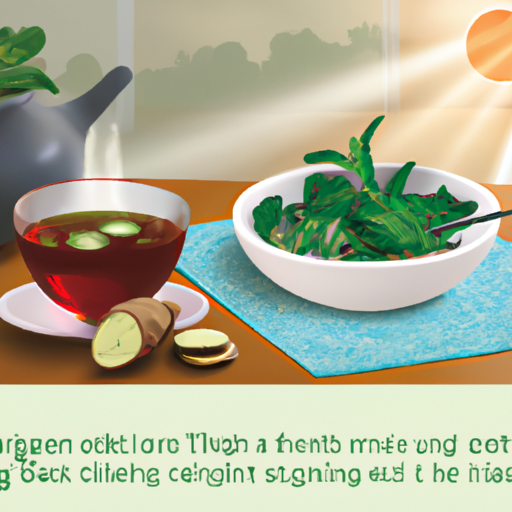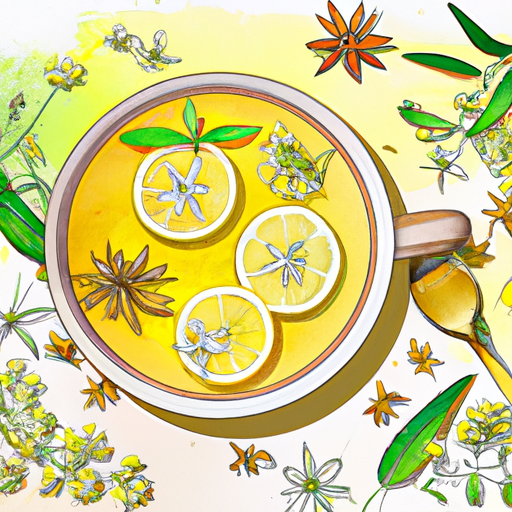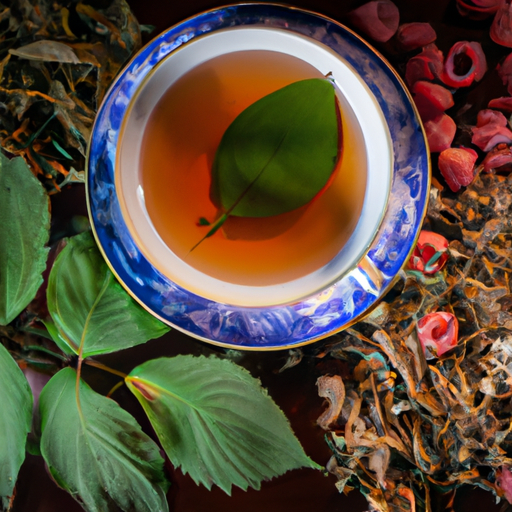As the popular saying goes, ‘A cup of tea is like a hug in a mug.’ However, have you considered the additional benefits of certain herbal teas beyond just warming your soul? If you are aiming to support healthy blood pressure, herbal teas could become your trusted ally. Packed with natural compounds and calming properties, these teas have demonstrated positive impacts on blood pressure levels.
In this article, we will explore some of the most effective herbal teas for lowering blood pressure.
First up, we have hibiscus tea, a vibrant and tangy brew that has been praised for its ability to lower blood pressure.
Next, green tea, a beloved beverage known for its rich antioxidant content, may also help reduce blood pressure levels.
Hawthorn tea, derived from the hawthorn plant, has been used for centuries as a natural remedy for cardiovascular health, including blood pressure regulation.
Chamomile tea, with its calming properties, may also have a positive impact on blood pressure.
Additionally, ginger tea, dandelion tea, and olive leaf tea are other herbal options that have shown promise in supporting healthy blood pressure levels.
So, grab your favorite mug and prepare to sip your way to better cardiovascular health with these herbal teas.
Key Takeaways
- Hibiscus tea has anti-hypertensive properties and can lower blood pressure.
- Green tea contains catechins, antioxidants that positively affect blood pressure.
- Hawthorn tea helps lower blood pressure and improves heart health.
- Ginger tea reduces inflammation, improves blood circulation, and lowers blood pressure.
Hibiscus Tea
If you’re looking for a herbal tea that can help lower your blood pressure, hibiscus tea is an excellent choice. It not only has a pleasant taste but also offers several health benefits. Studies have shown that hibiscus tea can effectively reduce blood pressure levels. This is due to the presence of bioactive compounds, such as anthocyanins and flavonoids, which have been found to have anti-hypertensive properties.
To prepare hibiscus tea for maximum effectiveness, start by boiling water and adding dried hibiscus petals. Let it steep for about 5-10 minutes, depending on your desired strength. Strain the tea and add honey or lemon for flavor if desired. It’s recommended to consume two to three cups of hibiscus tea per day to experience its blood pressure-lowering effects.
In addition to its blood pressure-lowering properties, hibiscus tea is also rich in antioxidants, which can help reduce inflammation and protect against chronic diseases. It has been shown to improve cholesterol levels and promote overall heart health. However, it’s important to note that hibiscus tea may interact with certain medications, so it’s always a good idea to consult with your healthcare provider before incorporating it into your routine.
Transitioning into the subsequent section about green tea, another herbal tea known for its health benefits, it’s worth exploring its potential in lowering blood pressure.
Green Tea
Green tea, known for its numerous health benefits, has been shown to effectively assist in reducing hypertension. This popular beverage is rich in antioxidants called catechins, which have been found to have a positive effect on blood pressure levels.
Studies have shown that regular consumption of green tea can lead to a modest decrease in both systolic and diastolic blood pressure.
One of the main benefits of green tea is its ability to improve cardiovascular health. The catechins in green tea help to relax blood vessels, allowing for better blood flow and a reduction in blood pressure. Additionally, green tea is known to have a positive effect on cholesterol levels, which can further contribute to a healthier heart.
Another advantage of green tea is its potential for weight loss. The catechins in green tea can help to boost metabolism and increase fat oxidation, leading to a reduction in body weight. This can be beneficial for individuals who are overweight or obese, as excess weight is often associated with higher blood pressure levels.
Green tea offers a range of health benefits, including its ability to lower blood pressure and promote weight loss. Its antioxidant properties and positive effects on cardiovascular health make it a valuable addition to a healthy lifestyle.
Moving forward, let’s explore the benefits of hawthorn tea for managing hypertension.
Hawthorn Tea
To manage hypertension, you can try incorporating hawthorn tea into your daily routine. Hawthorn tea is known for its potential benefits for heart health and its ability to help lower blood pressure. Studies have shown that hawthorn tea may have a positive effect on cardiovascular health by improving blood flow and reducing the risk of heart disease. It may also help relax blood vessels, which can lead to a decrease in blood pressure.
Making hawthorn tea at home is relatively simple. Start by boiling water and adding dried hawthorn berries to a tea infuser or teapot. Let the berries steep in the hot water for about 10-15 minutes, or until the desired strength is achieved. You can add honey or lemon for flavor if desired. It’s important to note that if you’re taking medication for high blood pressure or any heart condition, it’s advisable to consult with your healthcare provider before incorporating hawthorn tea into your routine.
Transitioning to the next subtopic, chamomile tea is another herbal tea that has been studied for its potential benefits in managing hypertension.
Chamomile Tea
Chamomile tea is a great herbal tea option for lowering blood pressure. It has been shown to reduce stress and anxiety, which are common contributors to high blood pressure. Additionally, chamomile tea promotes relaxation and better sleep, which can also have a positive impact on blood pressure levels.
Lastly, chamomile tea is known for its soothing properties on the digestive system, making it an overall beneficial option for those looking to lower their blood pressure.
Reduces stress and anxiety, which can contribute to high blood pressure
Relax, there’s an herbal tea that can help you ease stress and anxiety, ultimately contributing to the reduction of your blood pressure. Chamomile tea, a natural remedy for anxiety, has been shown to have calming effects on the body and mind. It contains compounds that bind to certain receptors in the brain, promoting relaxation and reducing stress levels. Studies have also found that chamomile tea can improve sleep quality, which is essential for overall well-being and blood pressure regulation. In fact, a 2016 study published in the Journal of Advanced Nursing found that chamomile tea consumption led to significant improvements in sleep quality and reduced symptoms of anxiety. So, sip on a cup of chamomile tea before bed to promote relaxation and better sleep, further aiding in the management of your blood pressure.
Promotes relaxation and better sleep
Unwind and get ready for a peaceful night’s sleep with a refreshing cup of chamomile goodness. Chamomile tea is known for its calming properties, making it the perfect beverage to promote relaxation and better sleep.
-
Chamomile tea promotes mental clarity by reducing anxiety and stress levels. It contains compounds that bind to certain receptors in the brain, producing a calming effect and improving overall well-being.
-
Additionally, chamomile tea has been shown to improve sleep quality. It contains an antioxidant called apigenin, which binds to certain receptors in the brain, reducing insomnia and promoting a more restful sleep.
By incorporating chamomile tea into your bedtime routine, you can experience the soothing effects that promote mental clarity and improve overall well-being. Soothing the digestive system is another benefit of chamomile tea, which we will explore in the next section.
Soothes the digestive system
After learning about how herbal tea promotes relaxation and better sleep, it’s fascinating to explore another benefit of herbal tea: soothing the digestive system.
Herbal teas have been used for centuries as natural remedies for digestive issues. They can help alleviate symptoms such as bloating, indigestion, and stomach cramps. Certain herbal teas like chamomile, peppermint, and ginger have been found to have specific properties that aid digestion and reduce inflammation in the gastrointestinal tract.
Chamomile tea, for example, has anti-inflammatory properties that can soothe the lining of the stomach and intestines. Peppermint tea has been shown to relax the muscles of the gastrointestinal system, promoting healthy digestion. Ginger tea is known for its ability to relieve nausea and stimulate digestion.
Transitioning into the next section, let’s dive deeper into the benefits of ginger tea.
Ginger Tea
Try incorporating ginger tea into your daily routine to help lower your blood pressure. Ginger tea has several benefits that make it a great choice for maintaining a healthy blood pressure. Firstly, ginger has been found to have anti-inflammatory properties, which can help reduce inflammation in the body and promote better blood flow. Secondly, ginger has been shown to improve blood circulation, which can help lower blood pressure levels. Lastly, ginger tea is a natural diuretic, meaning it can help the body eliminate excess fluid, which can contribute to high blood pressure.
To make ginger tea, simply peel and slice a small piece of fresh ginger root. Bring a cup of water to a boil and add the ginger slices. Let it simmer for about 10 minutes, then strain the tea into a mug. You can add a squeeze of lemon or a teaspoon of honey for added flavor if desired.
Transitioning into the subsequent section about dandelion tea, another herbal tea that can help lower blood pressure…
Dandelion Tea
Dandelion tea, known as the ‘liver cleanser,’ can work wonders for your overall health, just like a fresh breeze that sweeps away the dust and leaves everything feeling refreshed and renewed. This herbal tea is not only delicious but also packed with numerous benefits for the body.
Dandelion tea is believed to have diuretic properties, which means it can help promote the production of urine, aiding in the elimination of toxins from the body. Additionally, it may also support liver health by stimulating the production of bile, which aids in digestion and detoxification.
Apart from its detoxifying effects, dandelion tea is also a rich source of vitamins and minerals, including vitamin C, vitamin A, iron, and potassium. These nutrients are essential for maintaining good overall health and may help to strengthen the immune system.
To enjoy the benefits of dandelion tea, you can easily make it at home using dried dandelion leaves or tea bags. Simply steep the leaves or tea bags in hot water for about 5-10 minutes, strain, and enjoy. You can also add a touch of honey or lemon to enhance the flavor.
Now, let’s move on to the next herbal tea that can help lower blood pressure, olive leaf tea.
Olive Leaf Tea
Get ready to explore the surprising benefits of olive leaf tea, a natural remedy that can do wonders for your overall well-being. Olive leaf tea is made from the leaves of the olive tree, scientifically known as Olea europaea. It has been used for centuries in traditional medicine for its various health benefits.
One of the key benefits of olive leaf tea is its potential to lower blood pressure. Research suggests that olive leaf extract, the main active ingredient in the tea, contains compounds that may help relax blood vessels and promote healthy blood flow. This can lead to a reduction in blood pressure levels. In fact, a study published in the European Journal of Nutrition found that taking olive leaf extract for eight weeks significantly lowered both systolic and diastolic blood pressure in individuals with stage 1 hypertension.
In addition to its blood pressure-lowering effects, olive leaf tea is also rich in antioxidants, which can help protect against oxidative stress and inflammation in the body. These antioxidants may contribute to the tea’s potential to improve cardiovascular health and reduce the risk of chronic diseases.
It’s important to note that while olive leaf tea may have potential benefits for lowering blood pressure, it should not replace prescribed medications or medical advice. If you have high blood pressure, it’s always best to consult with your healthcare provider before making any changes to your treatment plan.
Frequently Asked Questions
Can herbal teas alone lower blood pressure or should they be used in combination with medication?
Herbal teas can complement medication in lowering blood pressure. Studies show that combining herbal teas with medication increases their effectiveness. However, it’s important to consult a healthcare professional to ensure safety and proper dosage.
Are there any potential side effects or risks associated with consuming herbal teas for blood pressure management?
There can be potential side effects, risks, and interactions associated with consuming herbal teas for blood pressure management. It is important to consult with a healthcare professional before incorporating herbal teas into your treatment plan.
How long does it take for herbal teas to show their effects on lowering blood pressure?
Factors affecting the absorption rate of herbal teas for lowering blood pressure include the type of tea, brewing method, and individual metabolism. Caffeine, present in some herbal teas, can temporarily raise blood pressure before its potential blood pressure-lowering effects kick in.
Can pregnant or breastfeeding women safely consume herbal teas for blood pressure management?
Pregnant or breastfeeding women should exercise safety precautions when consuming herbal teas for blood pressure management. It is advised to consult with a healthcare professional before trying any alternative remedies to ensure the safety of both mother and baby.
Are there any specific dosages or recommended intake guidelines for herbal teas to effectively lower blood pressure?
To effectively lower blood pressure, recommended dosages and intake guidelines for herbal teas should be followed. It’s important to consider potential interactions with medications or existing medical conditions.
Conclusion
In conclusion, incorporating herbal teas into your daily routine can potentially aid in lowering blood pressure. These natural remedies, such as hibiscus, green tea, hawthorn, chamomile, ginger, dandelion, and olive leaf tea, have been shown to have positive effects on blood pressure levels.
By exploring the benefits of these herbal teas, you can take a step towards a healthier lifestyle and potentially improve your overall cardiovascular health. So why not sip on these delightful brews and give your blood pressure a gentle nudge in the right direction?










